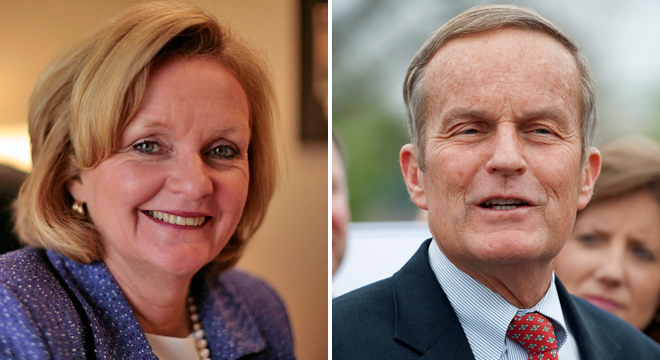Todd Akin had been his party’s official standard bearer for less than two weeks before his “legitimate rape” comments thrust the Missouri Senate race into the center of the national political conversation.
Before Todd Akin’s extraordinary meltdown, top Republican strategists up to and including Senate Minority Leader Mitch McConnell pegged GOP chances of taking control of the upper chamber at 50-50.
The question now is whether that oddsmaking is still valid. On the one hand, Akin’s comments have been politically devastating — for him. And the GOP’s panicked backlash suggests they worry the fallout could damage GOP candidates from Massachusetts to New Mexico. But at the same time, simply by winning the primary, Akin had already badly harmed the Republicans’ chances of retaking the Senate in November. And unless the “legitimate rape” row persists as a national problem for the GOP, by itself it merely accentuated an existing challenge for the GOP.
To win back the Senate the GOP has to win at least three seats on net — and that’s if Mitt Romney wins the presidency in November. If President Obama, who consistently leads national and swing state polls, wins re-election, Republicans need to pick up four to avoid giving Joe Biden a tie-breaking vote in the Senate.
Missouri should’ve been a relative gimme for Republicans. But for strategic purposes, Akin was enough of a liability before the legitimate rape fiasco that Republicans had to approach the map under the assumption that McCaskill would hold on. That’s not a friendly map.
To net four seats, not including Missouri, Republicans would have to win four of the seven most-at-risk seats held by vulnerable or retiring Democrats — Jim Tester’s seat in Montana, Sherrod Brown’s seat in Ohio, Bill Nelson’s seat in Florida, and seats being vacated by Nebraska’s Ben Nelson, North Dakota’s Kent Conrad, Virginia’s Jim Webb, and Wisconsin’s Herb Kohl — without losing a single one of their own vulnerable seats — particularly those held by Scott Brown in Massachusetts and Dean Heller in Nevada and those being vacated by Olympia Snowe in Maine, Jon Kyl in Arizona, and Dick Lugar, who lost his primary, in Indiana.
Currently independent Angus King — who’s many expect to caucus with Democrats — is favored to win in Maine. If his lead holds, Republicans will have to flip five seats.
Doing that without Missouri will be difficult. Democrats currently lead in polls of Montana, Ohio, Florida, North Dakota and Virginia. If their leads hold in Nebraska and Wisconsin, they still have to flip three races.
Thus, Dem strategists’ official view is that Akin’s flameout didn’t change much — except maybe to give them a bit more breathing room.
“An unorthodox but probably accurate view of the math post-Akin is that it doesnt change much,” one senior Democratic strategist said. “We thought we had a good shot in Missouri post-primary, not just because it was Akin but because we finally had someone to run against.”
In a bid to push Akin out of the race altogether, the GOP and its big money outside groups are saying they will not support him financially at all. In theory, that’s money that can now be deployed to other battlegrounds, making things marginally more difficult for Dems in those states.
But Dems think that if Akin stays in and polling stays tight that, Republicans will relent and start spending in the Missouri race again. And even if they don’t, the re-dispersed money will amount to a thimble in an ocean of outside cash already flooding those states.
“We don’t believe that because we think their money is almost infinite,” the strategist said.










